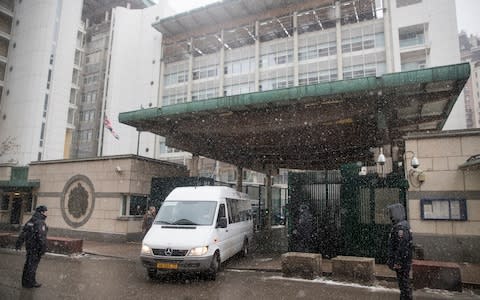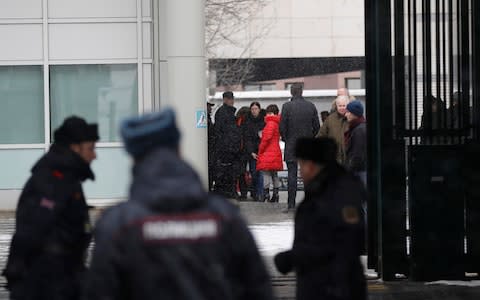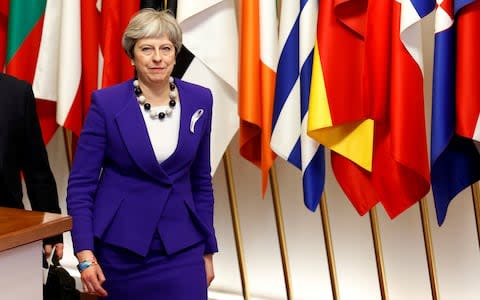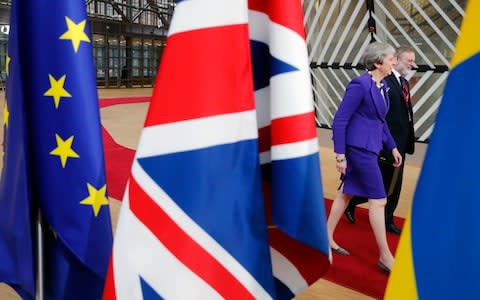Scores of Russian diplomats set to be expelled after EU leaders agree Russia 'highly likely' to have carried out Salisbury attack

Scores of Russian diplomats look set to be expelled from European capitals as ten EU countries indicated they were preparing to follow Theresa May's lead in the wake of the Salisbury attacks.
France, Poland, Ireland, Croatia, the Czech Republic, Lithuania, Latvia, Denmark, Estonia and the Netherlands are all in discussions about deporting suspected spies after Theresa May shared intelligence about the nerve agent attack at a meeting of the European Council.
Germany's Chancellor, Angela Merkel, has also hinted that she may be prepared to go beyond merely rebuking Vladimir Putin, and the EU recalled its ambassador to Moscow overnight in a show of solidarity with Mrs May.
Throwing their weight behind the Prime Minister, the 27 leaders of the European Council said it was “highly likely” that the Kremlin was responsible for the poisoning of Sergei Skripal and his daughter, Yulia.
Responding to the announcement on Friday, Moscow accused the UK of leading the European Union towards an "anti-Russia campaign".
In a statement, the Russian foreign ministry said the only explanation was that European leaders "wanted to help the British Prime Minister out of a difficult situation".
It came as Markus Ederer, the EU ambassador, was recalled from Moscow on Thursday night to consult with Brussels over the EU’s response to the attack, while a number of EU member states said they were poised to announce expulsions of Russian diplomats.
While Dutch prime minister Mark Rutte said the move was a "measure" rather a "sanction" against Russia, the decision paves the way for further retaliatory action against the Kremlin which could see its European spy network dismantled within a matter of weeks.
Meanwhile, a convoy of vehicles left the British Embassy in Moscow on Friday morning ahead of a Russian deadline for 23 diplomats to leave the country.

Russia said it was expelling the diplomats last Saturday in a carefully-calibrated retaliatory move against London, which has accused the Kremlin of orchestrating the nerve toxin attack.
On Friday morning, staff were seen embracing colleagues as vehicles were being readied on the grounds of the British embassy.

Leaving a dinner with European leaders on Thursday night, Mrs May said the Council was “standing together” against the growing threat posed by the Putin regime.
"I welcome the fact that the EU Council has agreed with the United Kingdom Government's assessment that it is highly likely that Russia is responsible for the attempted murder that took place on the streets of Salisbury and that there is no plausible alternative explanation,” she added.
"The threat that Russia poses respects no borders and it is a threat to our values and it is right that here in the EU Council we are standing together to uphold those values."
On Friday morning, Russian Foreign Minister Sergei Lavrov told reporters on a visit to Hanoi that the UK is "feverishly trying to force allies to take confrontational steps".

It came after five EU countries indicated they are prepared to follow Theresa May’s lead by expelling diplomats suspected of espionage.
France, Poland, Lithuania and at least two other countries are understood to be in discussions about co-ordinated expulsions of Russian Embassy officials in the wake of the Salisbury poisonings.
On Friday, Latvia said it would expel "one or several" Russian diplomats. The Czech prime minister Andrej Babis said it was "probable" his country would follow suit, with a decision to be made on Monday. Estonia is understood to be taking action.
Irish PM Leo Varadkar said Ireland would conduct a security assessment of Russian diplomats, which could lead to expulsions.
It comes as Donald Tusk, the president of the European Council, said leaders of the 28 EU states agreed that Russia is likely behind the attack.
At a dinner with other EU leaders in Brussels, Mrs May warned her allies that Russia represents a “long term” threat to each of them and urged them to consider taking action either individually or as a bloc.
#EUCO agrees with UK government that highly likely Russia is responsible for #SalisburyAttack and that there is no other plausible explanation.
— Donald Tusk (@eucopresident) March 22, 2018
Following a meeting between Mrs May, the French President Emmanuel Macron and the German Chancellor Angela Merkel, French officials hinted that the country was prepared to act.
Mr Macron and Mrs Merkel agreed on the importance of sending "a strong European message" to Russia.
Dalia Grybauskaite, president of Lithuania, confirmed she was contemplating the deportation of Russians, and Poland’s deputy foreign minister Bartosz Cichocki told The Telegraph his country was prepared to act unilaterally in expelling Russians if it encouraged others to take steps against Moscow.

EU leaders made a joint statement on Thursday night agreeing they stood in "unqualified solidarity" with the UK in a big victory for Mrs May.
In a joint statement, they said: "The European Council condemns in the strongest possible terms the recent attack in Salisbury, expresses its deepest sympathies to all whose lives have been threatened and lends its support to the ongoing investigation.
"It agrees with the United Kingdom Government's assessment that it is highly likely that the Russian Federation is responsible and that there is no plausible alternative explanation. We stand in unqualified solidarity with the United Kingdom in the face of this grave challenge to our shared security.
"The use of chemical weapons, including the use of any toxic chemicals as weapons under any circumstances, is completely unacceptable, must be systematically and rigorously condemned and constitutes a security threat to us all.
"Member states will co-ordinate on the consequences to be drawn in the light of the answers provided by the Russian authorities. The European Union will remain closely focused on this issue and its implications.
"Against this background, the European Union must strengthen its resilience to chemical, biological, radiological and nuclear-related risks, including through closer cooperation between the European Union and its member states as well as Nato.
"The European Union and its member states should also continue to bolster their capabilities to address hybrid threats, including in the areas of cyber, strategic communication and counter-intelligence. The European Council invites the European Commission and the High Representative to take this work forward and report on progress by the June European Council."
